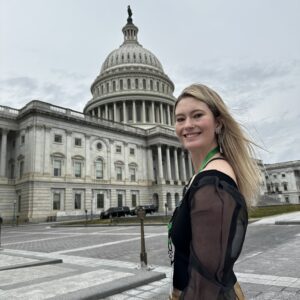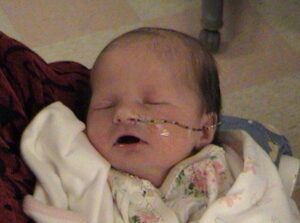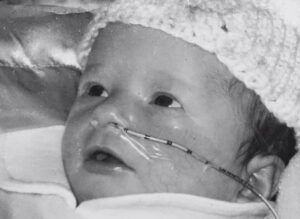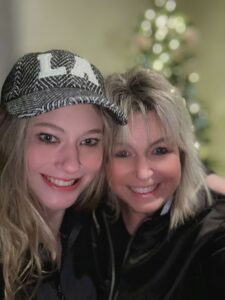
Rare Community Profiles is a Patient Worthy article series of long-form interviews featuring various stakeholders in the rare disease community, such as patients, their families, advocates, scientists, and more.
Kristi’s Fight to Combat Misconceptions about Prader-Willi Syndrome (PWS): “Our Children Have PWS; They Are Not PWS”
When I first met Justice Rickenbach at Rare Disease Day at the National Institutes of Health (NIH), I was immediately impressed by her fashion sense—especially her shiny and shimmery black pants. As her mother Kristi and I caught up at one of the tables, I mentioned how much I enjoyed the outfit. Kristi, with a laugh, said:
“She would love that. Just tell her. She’s definitely a fashionista—has always loved dressing up.”

The Rickenbach family has been part of the rare disease community since Justice was born twenty years ago. Diagnosed with Prader-Willi syndrome (PWS) soon after birth, Justice and her family have spent years disrupting the myths about what it means to have a rare condition. Says Kristi:
“What I want people to remember is that our kids have PWS, but that does not define who they are. They have hopes and dreams; they want to be accepted and loved. You cannot take a diagnosis and say, ‘This is what your child is going to be.’”
Driven to make a change for her daughter and other families in the PWS community, Kristi joined the Prader-Willi Syndrome Association USA (PWSA | USA) as a Parent Support Coordinator and also remains President of the PWSA Minnesota chapter. Through her work, both Kristi and Justice are working to create a better, stronger, and more equitable future for people with PWS.
In her recent discussion with Patient Worthy, Kristi dove into her family’s experiences, having hope for the future, and ways that parents can become more invested in advocacy and awareness.
Finding a Diagnosis
While her pregnancy was relatively uneventful, Kristi noticed that Justice wasn’t moving as much in the womb as some of her other children had. As she reflects on it now, she shares:
“If we could get hospitals and NICUs, and even OB/GYNs, to note that low fetal movement can signify PWS, it could contribute to earlier diagnosis and treatment. Kids with low muscle tone can’t help themselves be born. This is something that is more commonly detected now than 20 years ago, but it is still missed and that can be heartbreaking.”
At birth, Justice was extremely hypotonic (low muscle tone) and unable to eat. She was quickly moved to the NICU where doctors ran test after test, trying to figure out what was going on: was it a stroke in utero? Spinal muscular atrophy? Brittle bone syndrome, since the whites of her eyes were blue?

Doctors at the hospital were fairly certain that Justice had spinal muscular atrophy and would not survive through her childhood. Shares Kristi:
“They told us that she would most likely not make it to next year. We were sent home on Christmas day with a NG-tube and other equipment so that we could spend what doctors said would be our only Christmas together.”
At home, the family waited for test results. Kristi’s other four children bonded with their sister as days, then weeks, passed. Eventually, the tests came back with a diagnosis: Justice had Prader-Willi syndrome due to uniparental disomy. Rare disease diagnoses can be overwhelming and frightening. Yet, in all honesty, the first thing that Kristi felt was relief. She explains:
“To go from hearing that this would be our only Christmas together to knowing that she had PWS felt hopeful to me. You can live with PWS.”

What is Prader-Willi Syndrome (PWS)?
Prader-Willi syndrome is a rare genetic disorder that affects an estimated 350,000 people worldwide. This disorder is caused by an error in one or more genes located in a specific region of chromosome 15. As Kristi explains:
“This leads to some of the key features of PWS, which are learning disabilities, insatiable appetite, low muscle tone, behavioral challenges, growth hormone deficiency that can lead to short stature without the right treatment, and sleep disorders.”
While hyperphagia (insatiable appetite) is often considered the main characteristic of PWS, many families within the community say that there needs to be an increased focus on sleep disorders. This has been explored in a case study through TREND Community which explored excessive daytime sleepiness (EDS) in Prader-Willi syndrome. This case study and the data collected contributed to increased research into Pitolisant for PWS; in fact, this treatment just received Orphan Drug designation in this indication. Says Kristi:
“I’m grateful to TREND for bringing sleep disorders to light since these are so often overlooked. Doctors will say that our children are sleepy because they have low muscle tone. But I know for a fact that my daughter has narcolepsy with cataplexy and severe sleep disorders. That has been one of our greatest challenges over hyperphagia. I also believe that some of the behavioral issues come from being tired. When you’re tired, everything is harder.”
While Kristi encourages researchers to continue exploring EDS in Prader-Willi syndrome, and to advance their understanding of the disorder overall, she also reminds parents that not every child will have the same symptoms that she listed above. It is important to recognize and raise awareness of each child’s unique abilities. She shares:
“Each child is an individual. They are not PWS; they have PWS. People often make assumptions about what your child will or will not be able to do. Schools start panicking rather than seeing what your child’s capabilities are. We were given a list of things that Justice would never be able to do. So, I made it my mission that she would do all that and more, and she has. Would her life be easier without her gastroparesis, her PWS, and her narcolepsy? Sure. But she doesn’t know any differently. If I’m sad, she’ll be sad. If I love her for who she is and build her up, she’s going to be happy. I’m not sorry about her diagnosis and neither is she. This makes her who she is: a fighter. And she really likes herself. So never let myths and misconceptions dictate to you who your child is or what they can achieve.”

Treatments
Currently, the only approved treatment for Prader-Willi syndrome is growth hormone. Without growth hormone, children with PWS would have extraordinarily short stature. This treatment also helps with metabolism, body composition, cognition, and bone density. However, there is sometimes an obstacle to treatment: getting physicians on the same page of when to start treatment. Says Kristi:
“There is a lot of confusion on when to begin treatment or not wanting to start treatments right away. If we can get treatment started before a child is one year old, that’s good. But between three to four months old is the best time. Earlier treatment equals earlier benefit.”
Looking towards the future, Kristi hopes that researchers continue evaluating alternate and additional treatment options. While there are quite a few clinical studies being run, and research being performed into Pitolisant for EDS related to Prader-Willi syndrome, Kristi reinforces the need for more than one therapy:
“We need more than one medication to provide options for our families. My hope is that once one medicine is approved, it will be easier for subsequent medications. Our community has not had any new treatments since growth hormone was approved in 2000. Parents whose children have a lot of symptoms—their lives can be hard. We did an EL-PFDD meeting last year, and the Voice of the Patient report should come out soon. Hopefully, the FDA will “hear” that and realize that we need help. We need medications for our kids so that they can get out there, live their lives, be happy, and contribute. There are so many factors that hinder their independence and medication could really move us towards changing that.”
PWSA | USA: An Invaluable Resource
When Justice was fifteen months old, Kristi got in touch with the Prader-Willi Syndrome Association USA to find a stronger sense of community and learn more about PWS. She still remembers the first phone call and how much relief it gave her:
“The woman on the phone said, ‘Congratulations on your baby!’ That’s something you don’t hear often when you have a child with a rare condition. Then she said, ‘Everything is going to be okay.’ It was amazing to just have someone listen to my concerns and share their own experiences.”
When Justice was a few years old, Kristi transitioned into a volunteer position with PWSA | USA, calling doctors and putting together a list of physicians who saw people with PWS. Later, Kristi became a parent mentor. To her, there was nothing more meaningful than reaching out to families. She remembers how sad, scary, and lonely the journey can be and wanted to make sure that no other family found themselves in that position.

Four years ago, Kristi joined the PWSA | USA team as a Parent Support Coordinator. She shares:
“Usually, the first thing that parents do when receiving a diagnosis is Google. So, they’re often scared when they get in contact. They’re trying to figure out the medical terminology and questions, but they’re also grieving the child and future they thought they would have. I love to talk to parents and give them hope. Whatever a medical journal says, that isn’t their child. Their child is far more than any diagnosis. I tell them to try not to worry about the future. Enjoy your baby. Just love them. They’re going to grow up and you don’t want to look back and say, ‘I worried so much and didn’t need to.’”
Another conversation that Kristi has had with families in her community is how to balance the needs of a child with PWS with the needs of their siblings. As a mother of five, Kristi has had first-hand experience navigating this sometimes difficult landscape. Kristi says:
“I never missed things for my other kids, but Justice had to be the top priority at the time. I had to make sure that she was getting the meds she needed, fight for the best doctors and therapies, and manage frequent appointments and visits to out-of-state specialists. I never want any of my children to feel like I’m not giving them my all. This is something many caretakers struggle with. Caregivers can lose themselves in all this. Justice has taught my kids to be more inclusive and understanding, but I know the challenges of making things seem as normal as possible for your children. At PWSA, we provide a family support team to help parents work through these challenges and more: to cry with, share ‘inchstones,’ and trade tips.”
Additional resources offered by the PWSA include consultations and trainings for support staff, residential providers, and school personnel; a 24-hour crisis line to help families find support whenever is needed; comprehensive information on residential placement; a medical coordinator who can write letters to help families access growth hormone or other necessary medical needs; grief and bereavement support; and an advocacy program to help parents better advocate for themselves and their children. Says Kristi:
“If anybody ever wants to start advocating, call us. We have monthly meetings from advocates and classes on how to be an advocate. In May, we’ll be sourcing information on what is most pressing for our community to share it with advocates. We can make a difference by ensuring that everyone is on the same page about what we need to do to shift this community in a positive way. One thing that we’re working on is getting PWS approved as a disability throughout the country. Right now, it’s only approved as a disability in 14 states. If given the title of automatic disability, our kids in each state can receive medical assistance from the time they’re born rather than having to fight for it. Parents are already stressed enough. We shouldn’t have to fight to get the basic things that our children need.”
Learn more about how you can get involved with advocacy through the Prader-Willi Syndrome Association USA.


